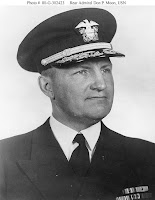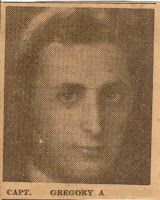438th AAA AW BN
APO 578 % Postmaster, N.Y.
England
30 April, 1944 0900
Sunday Morning
Good Morning, darling –
And a good morning it is, too; nine o’clock is really only 0700 because of the double summer time – but already the sun is shining brilliantly and everything outside seems so much alive. I’ve just had breakfast – there were only a few of us down, the rest were sleeping late. I haven’t shaved as yet, but I’m going to take my time. We’re supposed to have a volley-ball game on later, officers vs. enlisted men, and after that – I think the money will be here for the men’s pay – and ours, too. Another month has slipped by. This month was a good one, sweetheart, although we were actually engaged in March.
Mentioning pay reminds me that with the close of this month – the gov’t is six months late in changing my allotment to myself – and still no word from the New Jersey office where the changes are made. Our personnel office has sent out a couple of tracers – but still no word. I’m not worried because it’s on the books and it will come thru in a lump sum – eventually. In essence I’ve been getting $150.00 per month instead of $200; so I have $300.00 coming to me as of today.
Well – darling – yesterday was the third day in a row without mail – and I hope we’re not off to another one of those delays. When I don’t hear from you – I go upstairs and take out a couple of letters of yours from some time past – and it helps a great deal, too. I got another good laugh when I re-read your account of you and Ruby in downtown Boston. Every time you go to town – it’s like Alice in Wonderland; I never know what to expect. When we get to Salem, darling, I’ll show you all around the main street, point out the high curbstones, the blind crossings – and in general do my best to completely orientate you. If you have to go as far as Beverly or Marblehead or Peabody – I’ll insist on going with you. I’m only kidding, dear –
And according to your letter of April 9th – today is the day my folks are visiting yours. At least – I haven’t heard that the date was changed. Gee – it sure would be swell if I could be there and share in the general get-together. Usually I don’t like to be at things like that – particularly when I’m part of it; but you’ve done your part so admirably, sweetheart, I feel as if I should be along to help you. Anyway – I hope that all goes off well and that everyone gets along well.
Darling I’ve got to run along now. I’ve just had a call that the money has arrived and I want to pay my men before they go off on pass. They’re all ‘broke’. There’s nothing new to tell you about things here. Things are still status quo – and for the time being – that suits me. Remember, sweetheart, that I love you deeply and sincerely and whatever my present status is – it’s a temporary one and must eventually end with both of us together. Love to the folks.
And a good morning it is, too; nine o’clock is really only 0700 because of the double summer time – but already the sun is shining brilliantly and everything outside seems so much alive. I’ve just had breakfast – there were only a few of us down, the rest were sleeping late. I haven’t shaved as yet, but I’m going to take my time. We’re supposed to have a volley-ball game on later, officers vs. enlisted men, and after that – I think the money will be here for the men’s pay – and ours, too. Another month has slipped by. This month was a good one, sweetheart, although we were actually engaged in March.
Mentioning pay reminds me that with the close of this month – the gov’t is six months late in changing my allotment to myself – and still no word from the New Jersey office where the changes are made. Our personnel office has sent out a couple of tracers – but still no word. I’m not worried because it’s on the books and it will come thru in a lump sum – eventually. In essence I’ve been getting $150.00 per month instead of $200; so I have $300.00 coming to me as of today.
Well – darling – yesterday was the third day in a row without mail – and I hope we’re not off to another one of those delays. When I don’t hear from you – I go upstairs and take out a couple of letters of yours from some time past – and it helps a great deal, too. I got another good laugh when I re-read your account of you and Ruby in downtown Boston. Every time you go to town – it’s like Alice in Wonderland; I never know what to expect. When we get to Salem, darling, I’ll show you all around the main street, point out the high curbstones, the blind crossings – and in general do my best to completely orientate you. If you have to go as far as Beverly or Marblehead or Peabody – I’ll insist on going with you. I’m only kidding, dear –
And according to your letter of April 9th – today is the day my folks are visiting yours. At least – I haven’t heard that the date was changed. Gee – it sure would be swell if I could be there and share in the general get-together. Usually I don’t like to be at things like that – particularly when I’m part of it; but you’ve done your part so admirably, sweetheart, I feel as if I should be along to help you. Anyway – I hope that all goes off well and that everyone gets along well.
Darling I’ve got to run along now. I’ve just had a call that the money has arrived and I want to pay my men before they go off on pass. They’re all ‘broke’. There’s nothing new to tell you about things here. Things are still status quo – and for the time being – that suits me. Remember, sweetheart, that I love you deeply and sincerely and whatever my present status is – it’s a temporary one and must eventually end with both of us together. Love to the folks.
All my sincerest love, darling
Greg














